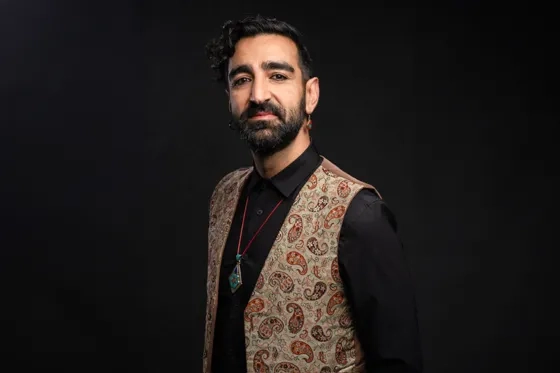SFCM Grad Named TED Fellow in Recognition for Work with Refugees
2011 composition graduate Sahba Aminikia created the mobile Flying Carpet Festival for children.
Sahba Aminikia’s voice just got a little louder.
The 2013 alumnus was named a TED (Technology, Entertainment, Design) Fellow in the influential organization’s 2024 class for his work with the Flying Carpet Festival, which also led him to give one of the group’s popular TED Talks this year.
Growing up in post-revolutionary Iran, Aminikia’s Baha’i faith left him at odds with the new, conservative Islamic rule. Despite being the second-largest religious group in the country, the Baha’i have been historically persecuted, a prejudice that increased after the Iranian revolution in 1979. Despite the country’s new constitution guaranteeing religious freedom for the Christian, Jewish and Zoroastrian minorities, the Baha’i went deliberately unmentioned, setting the stage for decades of human rights violations.
Aminikia left Iran at 19 for Russia, spurred by his love of Dimitri Shostakovich, before immigrating to America in 2006 to study at SFCM with David Garner, David Conte and then-chair of composition, Conrad Susa. While still a student, he got a big break thanks to one of the Bay Area’s most beloved institutions: the Kronos Quartet.
“I used to basically write pieces—like a string quartet, for example—and I would send it to 20 different performing string quartets,” Aminikia recalls. “Then came the 2009 post-election protests in Iran, and I was there for that summer, with millions of people protesting in the streets. I wrote a string quartet about that, called One Day; Tehran, and sent it to the office of Kronos Quartet. [Kronos founder and first violinist] David Harrington got back to me, so basically while I was still a student at the Conservatory, I started receiving these commissions from Kronos and a lot of ensembles that they introduced me to.”
With much of his work informed by human rights issues, Aminika wasn’t lacking inspiration in the past decade. “After the 2016 election,” he explains, “it was a very turbulent time, and I started looking for organizations all around the world to work with. At the time, it was the height of the Syrian civil war, and millions of refugees were being poured into Greece and the Mediterranean, many of whom drowned in the Mediterranean before making it. My research led me to this organization Sirkhane, in the southeast of Turkey, where about 3 million refugees have resettled after basically walking from Syria.”
Visiting Turkey and the town of Mardin where Sirkhane is located, Aminikia was moved to co-found the Flying Carpet Festival (along with Sirkhane founder Pinar Demiral) as “the first mobile festival for children living in conflict zones and difficult places.” That first year, he adds, “a lot of the people who came were my professors from SFCM, like Luciano Chessa… we brought about 40 artists to Mardin and had a 12-day festival.”
Because Sirkhane is a circus and art educational space, the festival was multidisciplinary from the get-go, and has evolved into a summer-long experience comprising hundreds of workshops and educational experiences centered around technology, art, music and circus. Around thirty artists, musicians, dancers, acrobats, and storytellers are also engaged to create “a cohesive artistic storytelling experience decorated with music, dance, circus arts, and visual projections for children of Syrian, Turkish, and Kurdish origin,” which then tours the region during the final week of the festival.
Funnily enough, Aminikia applied for a TED grant early on in the process of creating the festival—and didn’t hear back. But this year he was invited to give a talk at the organization’s April conference and speak about his work for a short video, which has been viewed nearly 13,000 times. “I got to hang out with these people that were attending the conference,” he says, “and that was amazing for the fundraising and establishing connections and networking for the festival. These opportunities come and they go and they are part of the process of empowerment for this festival, because it really does not belong only to me: It’s a platform we created with the organization and all these amazing artists who are coming and going.”
The sixth Flying Carpet festival wrapped at the end of September. Looking back, Aminika points out, “There are very few people that are able to support themselves through working and composing”—and that he’s grateful to be one of them—before continuing, “For me, though, the experience has been about providing an example of how we can bring all these ideas and what we learn into something practical that has an effect and impact on communities.”
Learn more about studying composition at SFCM.
